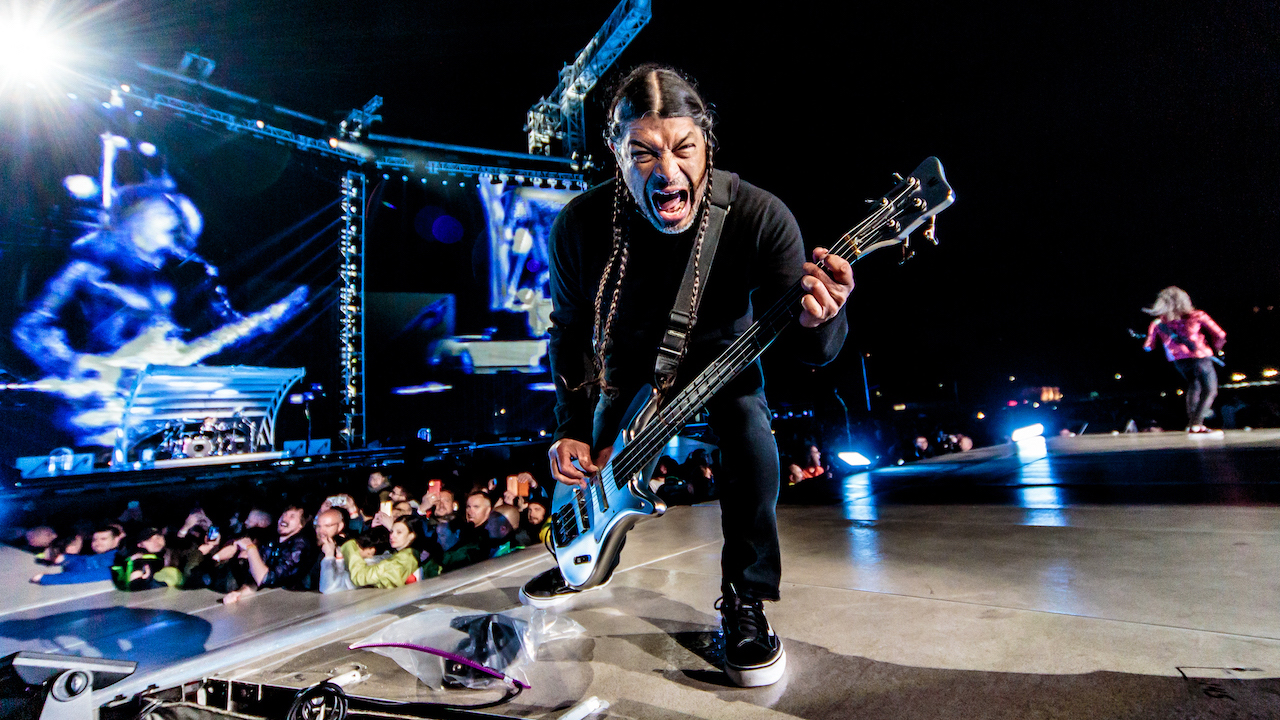“We end up drinking until 5 in the morning. I wake up with the worst hangover of my life, and now I’ve got to play with Metallica”: How a late-night drinking session with Lars Ulrich almost ruined Robert Trujillo’s Metallica audition
Robert Trujillo was announced as Metallica's new bassist on February 24, 2003, following a two-day try-out for the metal giants

All the latest guitar news, interviews, lessons, reviews, deals and more, direct to your inbox!
You are now subscribed
Your newsletter sign-up was successful
Metallica's third proper bass player after Cliff Burton and Jason Newsted deserves all of our praise. First, he's been in the world's biggest metal band since 2003, making him their longest-serving bassist.
Second, he's an absolute monster bass player, powering through funk, rock and metal styles with ease and panache. Third, he produced a documentary, Jaco, in 2012, telling the tragic story of Jaco Pastorius. Finally, he bought Jaco's famous ‘Bass Of Doom’ and restored it to the Pastorius family.
Robert Trujillo's story is one that began not long before the arrival of Metallica's self-titled 1991 album – in the very same city, in fact – when he joined skate-thrash mob Suicidal Tendencies near the end of the '80s.
In 1996, came an even bigger break – and quite possibly the ultimate dream for anyone who grew up listening to Black Sabbath. While Suicidal Tendencies certainly brought him success, joining Ozzy Osbourne's band was the move that enabled him to perform at the top level.
All of these influences and experiences brought Trujillo to the moment famously documented on Metallica's Some Kind Of Monster film, where he auditioned for the band, annihilated the competition and was given a cool million-dollar advance as a “welcome to the family.”
“One thing about being in Metallica is I've always felt challenged,” Trujillo told Bass Player. “It's a lot easier now than it used to be: when I first joined Metallica, I was kinda struggling! I had to learn over 20 years of catalog, plus the 12 songs from St. Anger which had never really been performed as a unit.
“Then there was that magnitude of press and everything else that goes with being in Metallica. I was juggling all of it.”
All the latest guitar news, interviews, lessons, reviews, deals and more, direct to your inbox!

In this clip from the Beneath the Bassline documentary, Trujillo spoke about his 2003 audition to replace bassist Jason Newsted, as captured in the 2004 band documentary Some Kind of Monster.
“It was a two-day audition, but the first day was more fly-on-the-wall,” says Trujillo. “Bob Rock had already recorded bass guitar and he was also producing St Anger, so I’m just there at the studio watching guitar tracks go down.
“The evening rolls around and Lars says, ‘Hey, let’s go get a drink.’ I could hold my own with a few beers, but we end up drinking until 5 in the morning. I wake up with the worst hangover of my life, and now I’ve got to play with Metallica.”
“James is sober. He’s gone through rehab. So I decided I would connect with my bass tech and decide what bass I was going to use, and what amp.
“What I was really trying to do was get away from Hetfield because I didn’t want him to smell the alcohol on me. Lars was probably just testing me to see how much I could handle, but I just felt like a loser.”
Bassists Pepper Keenan, Jeordie White, Scott Reeder, Eric Avery, Danny Lohner and Chris Wyse – among others – also tried out for the role, but after three months of auditions, Trujillo was officially declared the new bassist.
Instead of squandering his advance on a blur of decadence, as – let's face it – many of us would be tempted to do, Trujillo chose to lock himself in a room, armed to the teeth with nothing but Metallica tablature books. He was the new guy, and in his eyes, he had everything to prove.
“Everyone else had the music figured out because they wrote or recorded it, but the new guy needs to do his homework. Any time a band has an archive, it's almost guaranteed that at some point they're going to play an obscure song. The fans are going to call for it, so once I was caught up, it felt easier to adapt.”

Nick Wells was the Editor of Bass Guitar magazine from 2009 to 2011, before making strides into the world of Artist Relations with Sheldon Dingwall and Dingwall Guitars. He's also the producer of bass-centric documentaries, Walking the Changes and Beneath the Bassline, as well as Production Manager and Artist Liaison for ScottsBassLessons. In his free time, you'll find him jumping around his bedroom to Kool & The Gang while hammering the life out of his P-Bass.

